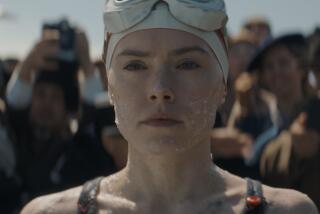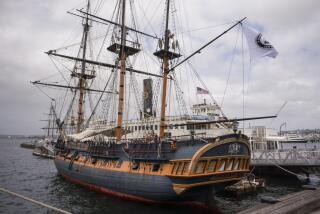Book Review : Tides of Fellowship Float on the Thames
- Share via
Offshore by Penelope Fitzgerald (Henry Holt and Co.: $15.95; 141 pages)
In her small but appealing novel, “Offshore,” Penelope Fitzgerald has constructed a driftwood kingdom.
Its inhabitants have quite literally drifted out of assorted injured or provisional states of life onto the right bank of London’s Thames River. They live on a miscellany of barges and houseboats; not a community, exactly, but the kind of fellowship of disparate circumstance that finds a tarred rope, a broken bottle and a rag doll side by side on the same stretch of beach.
Posh Chelsea is across the water, and some of the bargees have business or connections that take them over the bridge. But their refuge is the mud flats on the unpretentious and faintly raffish Battersea side.
Eccentricity and evanescence are the charm of these more or less temporary waifs; and Fitzgerald gives us a changing tide or two in their lives.
There is Willis, an old sailor whose specialty is painting pictures of schooners and yawls for other old sailors who once worked on them. He is getting too antiquated to stay on the river, and one of the modest threads of plot concerns his attempt to sell his barge to a trendy Londoner, despite the gaping leaks in its seams, so he can go live with his sister.
Maurice, another Bankside denizen, is a sweet-tempered prostitute who decorates his barge in a colorful attempt to make it look like something on a Venice canal. As the sparks fly upward, but contrariwise, Maurice is fated to get into dangerous situations. The most dangerous is his willingness to let his barge be used to conceal crates of stolen hair dryers.
Floating Citizens
The most stable of the floating citizens, at least seemingly, is Richard, a former Naval Reserve officer with a talent for getting things done. He uses the talent to help his more incompetent neighbors--regular meetings are held--as well as to keep his own craft, a converted minesweeper, in sparkling condition. He is a stalwart with a romantic streak, and his marriage is coming apart owing to his wife’s determination to shake the water from her galoshes and go live in the country.
A current of attraction, nicely constrained until the end, runs between Richard and the book’s protagonist, Nenna. She is Fitzgerald’s likable waverer, someone who can’t make up her mind. As Maurice tells her consolingly: “Decision is torment for anyone with imagination. When you decide, you multiply the things you might have done and now never can.”
What Nenna is trying to decide for most of the book is whether to go see her husband, Edward. Her life on her barge, with her daughters Martha, 12, and Tildy, 6, is a tizzy between land and water.
Edward is not simply undecided; he is virtually inexistent. After making messes of various schemes, he had gone off to work on a construction project in Panama; the idea being that he would save up enough to get himself and his family re-started back in England.
A Rotten Job
It was while waiting for this human feather that Nenna used the last of their money to buy the barge. When Edward returns, having saved nothing, he insists that she sell it. When she refuses, he refuses to come aboard, and takes up lodging and a rotten job in a remote suburb. It is an impasse.
Nenna conducts batty arguments in her head about giving way or standing firm. Finally, she resolves matters with a comically nightmarish visit to the suburb. Only then is she convinced that Edward doesn’t really want her, or anything much else, for that matter.
As the tidal Thames rises and falls, the barges float and settle, re-float and re-settle. So do Fitzgerald’s tidal characters. Sometimes she makes them too lovable and quaint, something like Saroyan. Nenna’s two children, actively rummaging in the scabrous dockland back streets, are freighted with wisdom and a vocabulary beyond their years.
But the author’s prose, spare and delicate, generally rescues things. Nenna watches Willis pottering along the bank. Coming beside Maurice’s barge, he spots the stolen hair dryers, stops for a while, contemplates and moves on.
“Nenna,” Fitzgerald tells us, “might have added to her list of things that men do better than women; their ability to do nothing at all in an unhurried manner.”
More to Read
Sign up for our Book Club newsletter
Get the latest news, events and more from the Los Angeles Times Book Club, and help us get L.A. reading and talking.
You may occasionally receive promotional content from the Los Angeles Times.










